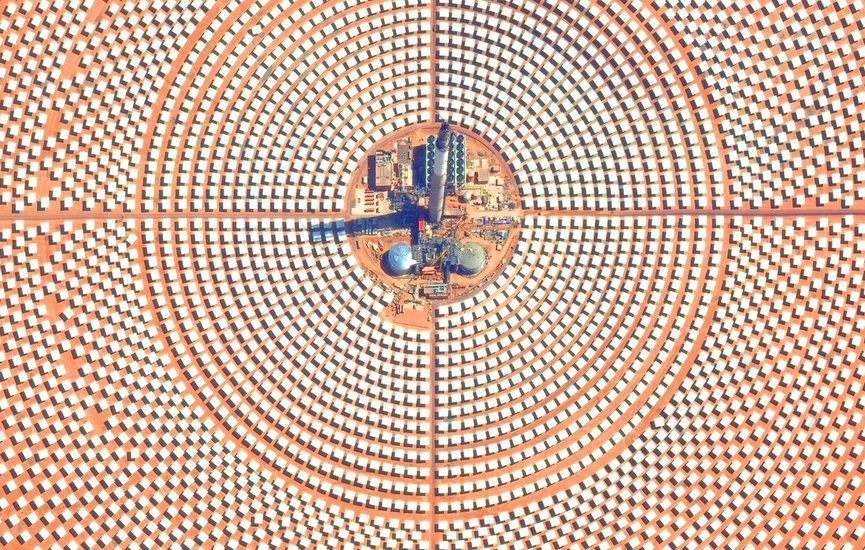Marrakech – Following the British government's rejection of the major transcontinental renewable energy project that sought to import solar and wind power from Morocco to the UK in late June, Xlinks has rebranded itself as Sila Atlantik.
The venture now charts an ambitious new path to deliver Morocco’s abundant solar and wind resources directly to German consumers via a pioneering submarine cable system.
According to multiple German news outlets, the massive infrastructure project aims to transport electricity generated by Morocco’s renewable energy installations to Germany using 4,800 kilometers of high-voltage direct current (HVDC) cables.
The undersea power line will span the Atlantic, crossing through the territorial waters of Portugal, Spain, France, Belgium, and the Netherlands, before connecting to Germany’s power grid at various points.
Sila Atlantik aims to deliver 26 terawatt-hours of clean electricity annually, which would cover about five percent of Germany’s total energy consumption. The project features two parallel submarine cables with a combined capacity of 3.6 gigawatts, with the potential for future expansion to 15 gigawatts as demand grows.
Leadership positions for the initiative have been filled by industry veterans from energy giants EnBW and Orsted, who now spearhead the project through X-Links Germany GmbH. Major energy companies like Eon, Uniper, and possibly Octopus Energy have shown interest, enhancing the project's credibility.
Seeking Government Support
The financial cost of Sila Atlantik is estimated between €30-40 billion, a significant investment that developers acknowledge will require government guarantees. Project leaders have indicated their intention to seek state support to secure the necessary funds.
Unlike Desertec, a similar initiative that failed in the early 2000s due to financial and political challenges, Sila Atlantik benefits from lower renewable energy production costs and recent advances in transmission technology.
The cost of producing solar and wind energy has drastically decreased over the past two decades, making such large-scale projects more feasible. The use of state-of-the-art, direct-current undersea cables also reduces transmission losses and avoids the community opposition often encountered with overland power line construction.
For German consumers, the project promises five key benefits: reduced electricity costs through increased supply, lower carbon emissions, savings on network infrastructure due to Morocco’s reliable renewable generation, improved power delivery to energy-deficient southern Germany, and increased capacity for energy-intensive industries, particularly AI data centers, which are expected to strain Germany’s power grid.
The Sila Atlantik trademark was registered with the German Patent and Trademark Office (DPMA) on January 31 and officially approved on May 5, a key milestone indicating the project’s progress and long-term ambitions.
Challenges Ahead
Despite these promising developments, several significant challenges remain. The high financial requirements of the project necessitate substantial government support, which could lead to taxpayer exposure. The political dependence on Morocco also introduces geopolitical risks, and coordinating permits across five different countries adds complexity to the project.
Another major hurdle is the global scarcity of specialized high-performance cables, essential for the undersea lines. As a result, Sila Atlantik is considering establishing production facilities in Morocco to meet these needs.
German energy companies remain cautiously optimistic about the venture. Uniper confirmed initial support but emphasized that final investment decisions would depend on the project's "intensive startup phase." Eon expressed similar cautious enthusiasm, while the German Federal Ministry of Economics declined to comment, stating it was too early to evaluate the project.
Under the most ambitious timelines, electricity transmission could begin as early as 2034, with the system reaching full capacity by the late 2030s. This timeline means any benefits for consumers will likely be felt in the next decade.
The current energy situation in Germany highlights the urgent need for such solutions. In 2024, about 4.2 million German households had outstanding payments to energy providers, and 6.4% of renters were struggling to pay their electricity and gas bills. Energy prices have risen sharply, with average electricity costs for a typical German household now reaching 36.51 cents per kilowatt-hour in 2025, up from 27.54 cents in 2015. Gas prices have also nearly doubled since 2015.
Through Sila Atlantik, Morocco could position itself at the heart of Europe’s energy transition, establishing a direct connection between the Sahara’s vast renewable resources and Germany’s industrial sectors.
The success of this transcontinental energy project will depend on sustained political commitment, diplomatic coordination, and the successful execution of cutting-edge technology over the next decade.
